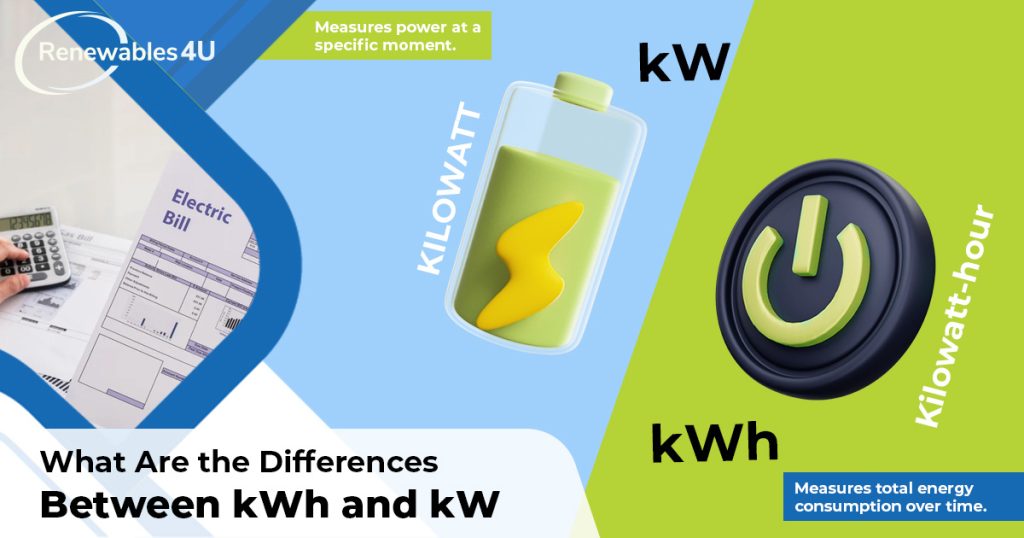
Ever wondered about the numbers on your energy bill or how much juice your appliances slurp up? Understanding the difference between kilowatt-hours (kWh) and kilowatts (kW) is your ticket to unravelling the energy consumption puzzle.
In plain terms, kWh measures how much energy you’ve used, while kW tells you how fast you’re using it. This may sound technical, but stick with us – knowing this stuff can help you make smart decisions about your energy use and even design more efficient systems.
kW – Power Measurement
Let’s start with kilowatts (kW). This is all about the rate at which electricity is gobbled up.
Think of it like the speedometer in your car but for electricity. One kilowatt is just a fancy way of saying 1,000 watts.
If a device has a high kW rating, it means it needs more electrical power to do its thing. Imagine your air conditioner has a 3 kW label; it’s like saying it gulps down 3,000 watts every hour it’s on.
The higher the kW, the more power-hungry the gadget. Everyday examples, like heaters, air conditioners, or big machines in factories, give you a sense of how much power is packed into kilowatts.
kWh – Energy Measurement
Now, onto kilowatt-hours (kWh). This is the total amount of electricity you’ve used over time – it’s the energy tally.
If kW is the speedometer, kWh is the odometer, showing how far you’ve travelled. The relationship between kW and kWh is straightforward: higher power usage over more extended periods means you’re consuming more energy.
To get the kWh, you just multiply the power (kW) by the time it’s used (hours). For example, if you charge your electric car with a 22 kW charger for an hour, you’ve consumed 22 kWh.
It’s like keeping track of how far you’ve driven but for your electricity use.
kW versus kWh: Energy vs Power
Let’s clear up the difference between energy and power. Energy is the capacity to get things done – it’s like having the ability to push a car.
Power, on the other hand, is how fast you can use that energy. It’s like stepping on the gas pedal to make the car move.
The distinction is vital because it helps you make smart choices about how you use electricity. Knowing the difference empowers you to think about not just how much power you’re using but also how efficiently you’re using it.
kW versus kWh: Application in Solar Batteries
Now, let’s bring this home with a real-life example – solar batteries in Australia. Kilowatts measure a solar system’s potential to generate power, like gauging how much sunlight it can convert into electricity.
On the flip side, kilowatt-hours tell you the storage capacity of a battery, revealing how much solar energy it can store. In Australia, when you see solar battery costs, they’re often in dollars per kilowatt hour ($/kWh).
The popular choice? A 10 kWh battery.
Take a 6 kW solar battery in an Aussie household – that number refers to its potential storage capacity, typically measured in kilowatt-hours (kWh). The cost?
It can range from $900 to $2,000 per kilowatt-hour. So, if you’re looking at a 6 kW solar battery, it might store around 13-16.6 kWh of energy.
This means you’ve got storage space for the energy your solar panels generate during sunny days, ready to use when the sun takes a break.
Empowering Your Energy Journey
In the grand scheme of things, knowing the difference between kWh and kW is like having a roadmap for your energy choices. kW tells you how fast you’re going, and kWh shows you how far you’ve travelled.
Whether you’re figuring out your monthly bill or planning a solar setup for your home, this knowledge is your compass. So, here’s the takeaway: the next time you see those kWh and kW numbers, you’re not just looking at jargon – you’re deciphering your energy story.
As we all move towards a more energy-conscious world, understanding these units is your secret weapon. To take charge of your energy destiny, think about getting solar quotes.
It’s your first step toward a more informed and empowered energy journey.
Reviewed by

Tom Ransome
Co-Founder of Renewables4U and renewable energy advocate. He has experience and extensive knowledge in the field, including a groundbreaking academic thesis and a significant role in Australia's solar industry since 2016. With a BA in Business Studies, focusing on finance and management, Tom merges business acumen with technical expertise to deliver economically and eco-friendly projects.

